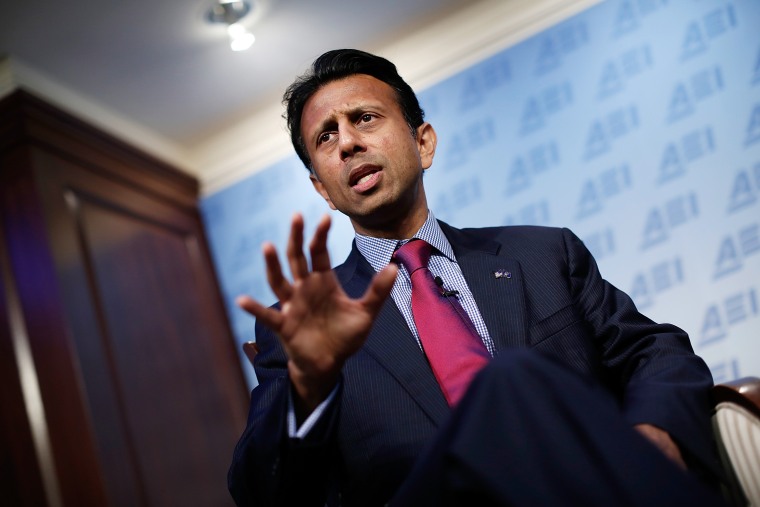Louisiana Gov. Bobby Jindal's (R) presidential campaign isn't going as well as he'd like. A recent poll found him in eighth place with just 3% support -- in his own home state. At the national level, Jindal is in even worse shape.
Facing conditions like these, the far-right governor has looked for new and creative ways to stand out in the crowded Republican field. This week, for example, Jindal demanded that the father of the Oregon mass-shooter issue a public apology -- an arguably tasteless campaign gambit, but one that nevertheless generated some headlines for the Louisianan.
But ugly rhetoric alone won't get Jindal on track; he's going to need some policy proposals, too. The Wall Street Journal reports today on the GOP governor's tax plan, which is a doozy.
Louisiana Gov. Bobby Jindal, seeking to breathe life into his presidential campaign, is taking a sharply different approach to tax policy than his Republican rivals. The presidential contender plans to unveil a tax plan Wednesday in Iowa whose goal is to make all citizens pay at least some federal income tax. That puts Mr. Jindal at the center of a long-running debate over who foots the cost of federal spending.
In a written statement, Jindal repeated a familiar far-right talking point: “We simply must require that every American has some skin in this game.”
Wait, does that mean that Jindal is pushing a tax increase on millions of American families? As a matter of fact, yes.
According to the Wall Street Journal piece, Jindal intends to overhaul the tax code, pushing those at the bottom into a 2% rate. His plan "would also eliminate most deductions, including those that allow millions of Americans to pay nothing in federal income taxes."
This would coincide, of course, with massive tax breaks, which Jindal estimates would "reduce the federal tax revenue by $9 trillion" over the next decade.
In other words, we're talking about a plan that would cut taxes on the wealthy, while increasing taxes on the poor. All of this would be part of a deliberate, regressive strategy to redistribute wealth in the wrong direction.
As for the "skin in the game" argument, a variety of far-right officials have complained in recent years about the number of working-class Americans with no income-tax burden. It's a "problem" Jindal intends to "fix" with a tax hike on those who can least afford it.
But let's not forget the details that conservatives generally overlook: those who are effectively exempted from income taxes don't make enough money to qualify. As regular readers may recall, these same Americans, however, nevertheless pay sales taxes, state taxes, local taxes, Social Security taxes, Medicare/Medicaid taxes, and in many instances, property taxes.
But for Jindal, that's not quite good enough.
If nothing else, his plan will help Jindal draw an important distinction between his platform and his rivals'. To date, no other GOP candidate has proposed raising taxes on low-income households, making Jindal unique in the 2016 field.
